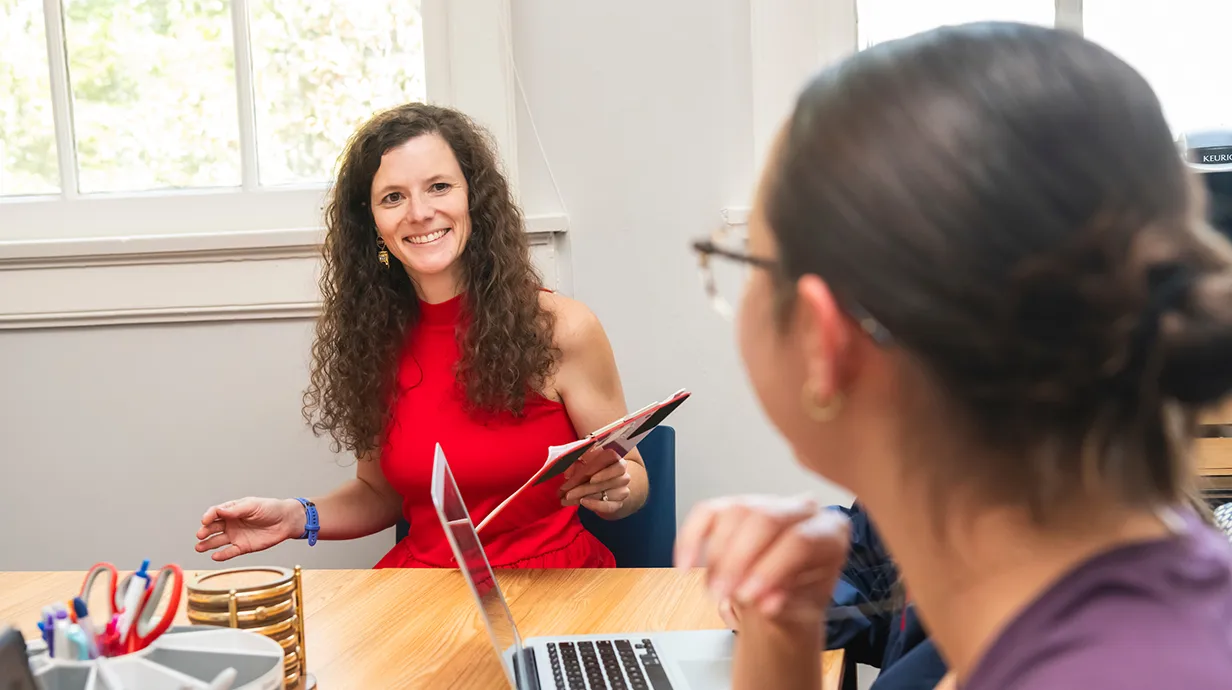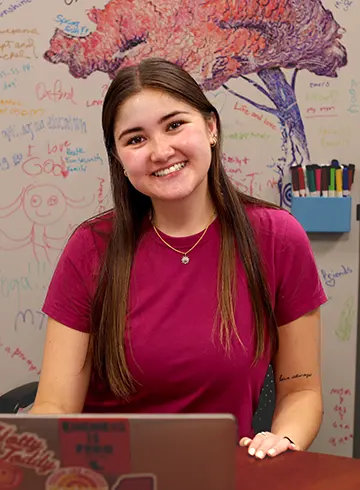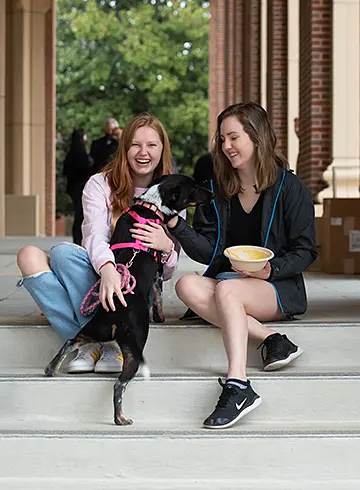Undergraduate Research Opportunities
Gain valuable research experience as an undergraduate as you work alongside professors in their labs.

Discover the Perfect Research Opportunity for You!
Gain credits toward your overall degree while learning research methods and working in labs on exciting research projects with your professors.
Here are just a few of the topics our professors are researching:
- Social and cognitive development across the lifespan, with an emphasis on infancy and early childhood. We are interested in how children come to control their thoughts and behavior and what supports this development.
- Emotion, specifically facial and verbal expression of emotion and the influence of personality and situational factors on self-regulation of emotion.
- Psychological and social factors that contribute to poor health behaviors among adults with chronic health conditions – particularly individuals with type 2 diabetes, obesity, hypertension, and persistent respiratory conditions (i.e., asthma and COPD).
- Treatment of anxiety disorders across the lifespan, focusing on cognitive, emotional, and physiological processes that underlie a variety of anxiety disorders.
- Disaster mental health (i.e., clinical-disaster psychology), with specific regard for disaster preparedness, mitigation, response, and recovery, with consideration for the context of natural disasters, technological disasters, and pandemic – Areas of emphasis include psychological first aid, perceived meaning and purpose in life, and related positive psychological concepts such as resilience, self-efficacy, and posttraumatic growth.

Faculty Cheering You on
"My department is a special place because of the amount of support it offers its students. With every course, research lab, presentation, etc., faculty and peers cheer you on, offering words of encouragement and advice. It is really comforting to know you have so many people in your corner as you take on those endeavors. The professors create an environment that is inviting to questions and comments, which makes the courses more engaging and interesting. My research lab has given me countless opportunities to exercise the skills I have learned in class."
Rebecca Tse
Psychology '25
About Research Course Credit
Register for any of the classes below with instructor approval to get enrolled in an assistantship.
Psy 405 or 406: Research Problems I & II
Psy 420 or 421: Readings and Research in Psychology I & II
Psy 422: Research Experience
These courses are utilized by many psychology professors to provide credit to students for unique research experiences working with psychology professors within the department. They are not listed in the class schedule each semester so you must ask.
Hours and grading
- These courses are 1 – 3-credit hour courses and you can take each course a maximum of two times for credit.
- Psy 405 and 406 are not graded (Z grade).
- Psy 420 and 421 are graded and will impact your GPA
All courses count as elective courses within the psychology major but you can only use 6 credit hours towards your major requirements (any credits over that would go towards your overall credits towards graduation).
Required prerequisite
- Permission of instructor
You cannot enroll in these courses without instructor approval (in other words you cannot add them to your schedule on myOleMiss), so you will need to follow the advice below for how to obtain a research experience. Scheduling your time for these courses in on an individual basis; it depends on the faculty members' research schedules and the nature of the project(s).
Time commitment and work expectations
Scheduling time for these courses is on an individual basis; it depends on the faculty members' research schedules (see below) and on the nature of the project.
Many professors fill their lab positions for the following semester or year as early as possible (within the first half of the semester before or during the spring semester for the following year), so look into this as soon as possible.
If you are interested in taking a research experience class,
- familiarize yourself with the labs/professors currently offering these experiences to students.
- make sure you meet the expectations that professors have for research assistants (e.g., minimum GPA).
- contact the professor via e-mail or visit them in person during their office hours to express your interest and see how you can apply for a position.
- apply to the position in a professional manner.
- if you are offered a position, make sure you can honor the commitments before accepting the position.
You cannot add the research classes to your schedule on myOleMiss, so you will need to complete an "Add class" form, have the professor sign it, and submit it to the department office.

Go beyond what you think you are capable of
"Psychology classes can seem very intimidating at first because they aren't classes you typically see in high school, so the material is all new. However, the professors here will do everything they can to help you succeed. I also highly recommend joining a research lab. Research is such an important aspect of the field, so even if it is not your long term goal to be in the lab, seeing how it is done can be very eye opening and beneficial!"
Alexis Bass Glenn ('22)
Registered Behavior Technician in Florida; earning master's in Social Work
Honors College Thesis Projects
Many psychology majors are in the Sally McDonnell Barksdale Honors College and complete an honors thesis. Here are some recent examples of the research they completed in the department.
Bishop, Mary, "Examining the relationship between Misophonia and Depression"
Bush, Alexandra Isabella, "Sharing My Story Through Public Speaking: Young People and Mental Health"
DuPerier, Elizabeth Gray, "The Role of Narrative Medicine in Patient Healing and Meaningful Clinical Practice"
Fair, Lara, "Analyzing the Unique Role of Repetitive Negative Thinking on Insomnia in College Students"
Fortner, Sarah Ryann M.; Semko, Joshua, "Meet Them Where They Are: Investigating the Feasibility and Acceptability of Artificial Intelligence-Avatar-Delivered Community-Based Psychological First Aid Programming in a University Setting"
Franklin, Khadeejah and Saval, Alexa, "Key Barriers to University-Enrolled Student Parents Enhanced by the COVID-19 Pandemic"
Hymel, Marie-Josée, "Loneliness and Pain in Individuals with Migraine"
Markham, Kaylee, "Grit Games: Do Incentives Play A Role?"
Melvin, Kaylan, "The Associations Between Adolescent Motives for Social Media Use with Body Dysmorphia, Eating Disorder, and Anxiety and Depression Symptoms"
Daniels, Rachel, "The Effects of Survival, Pleasantness, and Storytelling Conditions on True and False Memory Recollection"
Nosal, Emeri Rose, "Examining the Influence of Training on an Event-Based Prospective Memory Task in 3-Year-Olds"
Arunachalam, Aswin, "Perseverative Thinking and Thought Suppression: Links to Medication Non-Adherence Among Adults with Type 2 Diabetes"
Embry, Racheal, "Relations between Parent Reports of Effortful Control and Behavioral Measures of Executive Function in Toddlers"
Havertape, Ella, "Sleep's Relationship to Executive Functioning in Toddlers"
Mitchell, Kallen E., "Guardian's Goals and Gains: The Relationship between Need Satisfaction and Parenting Goals in Parents of Toddlers"
Lewis, Caroline, "The Effects of Processing Tasks on False Memories"
Morse, Cole, "Predicting Personal Growth: An Analysis of Self-Relevant Approaches"
Explore Available Research Opportunities
-
Dr. Sarah Bilsky | Clinical Psychology
Research Areas: Understanding familial processes that increase risk for parent and adolescent psychopathology and substance use. Lab takes a transdiagnostic approach to examine the processes contributing to the developmental psychopathology of anxiety and related disorders. This research spans several stages of development (i.e., childhood, adolescence, and adulthood) although the primary focus is the development and maintenance of these issues among adolescents and their parents. Expectations: Undergraduates attend weekly lab meetings, and contribute between 6-9 hours of time to the lab each week. Undergraduates will have the opportunity to assist with experimental protocols, participant recruitment, literature reviews, behavioral data coding, reading articles, and developing presentations.
Email Dr. Bilsky or visit Peabody 302D -
Dr. Laura J. Dixon | Clinical Psychology
Research Areas: The HART (Health and Anxiety Research and Treatment) lab studies the causes, persistence, and treatment of anxiety disorders across all ages. Using a transdiagnostic approach, it explores behavioral, cognitive, emotional, and physiological factors underlying anxiety. The lab also examines how anxiety impacts health, including its role in maladaptive behaviors (e.g., substance use) and worsening medical conditions (e.g., skin disorders). Expectations: Students are expected to attend weekly lab meetings and to work at 6-9 hours each week in the lab, which includes activities such as collecting data, running participants through experimental protocols, entering data, double-checking data and recordings, conducting literature searches, reading/discussing articles, and developing independent projects/poster presentations.
Email Dr. Dixon More information on the HART lab Apply -
Dr. Andrew Hales | Experimental Psychology
Research Area: Dr. Hales’s lab focuses on social ostracism. We conduct experiments to understand how people respond to ostracism, and the factors that cause them to ostracize others. We also do experiments looking at social influence and the appeal of extreme groups and ideologies. Expectations: Research assistants will gain hands-on experience in the fundamentals of experimental social psychology as they engage in 6 to 9 hours of lab activities per week. Typical activities include: developing stimulus materials for studies, conducting literature reviews, coding open-ended responses, testing surveys, and attending weekly or biweekly lab meetings.
Email Dr. Hales -
Dr. Laura Johnson | Clinical Psychology
Research Areas: Cultural competence in clinical training and mental health programming, psychosocial and cultural adjustment of refugees, immigrants and international student, program evaluation and outcome research (particularly of community based preventative interventions for youth), and multicultural/cross-cultural research lab. Current projects are youth development in China, Jane Goodall's "Roots and Shoots" multinational survey, cultivating youth environmental leadership and civic engagement, acculturative stress in international students, barriers to American students' friendship with international students and racial identity, and acculturation and spirituality in African-American help-seeking.
Email Dr. Johnson or visit Peabody 301B -
Dr. Kate Kellum | Behavior Analysis
Research areas: Complex human behavior: choice, self-knowledge, and rule governance, behavior acquisition, behavior analysis, social issues, teaching and evaluation at the university level. Expectations: Students in the lab will either work 5-7 lab hours or assist in lecture classes and work 2 lab hours. Attendance in 1 and a half hour weekly lab meetings is required. Lab work includes entering/checking data, running studies, assisting with studies, individual research, conference prep and presentations, and lab assistance. Potential Labbies: Must have successfully completed a class with Dr. Kellum.
Email Dr. Kellum -
Dr. Aaron Lee | Clinical Psychology
Research Areas: Psychological and social factors that contribute to poor health behaviors among adults with chronic health conditions – particularly individuals with type 2 diabetes, obesity, hypertension, and persistent respiratory conditions (i.e., asthma and COPD). Expectations: Lab members are expected to attend lab meetings and provide a minimum of 6 hours of lab related work each week including entering data, reviewing/cleaning data, conducting literature reviews on related topics, and pursuing independent research projects. Lab members may have the opportunity to develop independent research projects and poster presentations.
Email Dr. Lee for a lab application -
Dr. Stephanie Miller | Developmental Psychology
Research Area: The Cognition Underlying Behavior (CUB) Lab is a developmental research lab. We study social and cognitive development across the lifespan, with an emphasis on infancy and early childhood. We are interested in how children come to control their thought and behavior and what supports this development. In addition, we study how this control relates to other social and cognitive processes, like social understanding and memory.
Email Dr. Miller More information on the CUB lab Apply -
Dr. Nick Prins | Cognitive Psychology
Research Area: Visual Perception. Expectations: Most of your time in Psy 405 will be spent acting as a participant in research on low-level visual processes. Testing is self-paced and typically not very demanding. Scheduling hours (about 4 hours per week) is very flexible as you will learn how to get the experiment up and running yourself after which you can test without supervision. During meetings, the background, purpose, and results of the research will be discussed. Requirements are that you are reliable (i.e. show up for the times you have signed up for) and take the testing seriously.
Email Dr. Prins or visit Peabody 301A -
Dr. Grace N. Rivera | Experimental Psychology
Research Area: Existential, cultural, and moral psychology. Research is guided by an interest in how lay-theories (i.e., beliefs people hold about the way the world works) influence the way we approach life and the people around us. Specifically, she examines lay beliefs concerning true selves, American meritocracy, and about the heritability of human characteristics. Expectations: Attending weekly lab meetings, helping with lab data collection efforts such as assisting in study programming, test-running surveys, running studies, helping with literature searches, and coding data. Students will have opportunities to assist in all aspects of the research process, from idea generation to data analysis and presentation. Students are expected to work 6/9 hours per week depending on the number of credits.
Email Dr. Rivera -
Dr. Matt Reysen | Cognitive Psychology
Research Area: Students interested in working on research projects involving false memory, social influences on memory performance, and other basic memory phenomena are invited to inquire about the availability of opportunities to work on these and other related projects.
Email Dr. Reysen or visit Peabody 301C -
Dr. Stefan E. Schulenberg | Clinical Psychology
Research Area: The University of Mississippi’s Clinical-Disaster Research Center (UM-CDRC) is an integrated research, teaching, and training center with emphases in disaster mental health and meaning and purpose in life. The UM-CDRC conducts research and provides education in the areas of disaster preparedness, psychological first aid, disaster mental health response and recovery, meaning and purpose in life, resilience, and posttraumatic growth. Expectations: Students work for the UM-CDRC approximately 7 hours per week (e.g., team meetings, collecting data and resources, data entry and analysis, staffing the center, assisting with administrative tasks). Given the nature of what the center does in terms of research, teaching, training, and administration, students must be responsible, organized, respectful of others, helpful, and thorough. Prerequisites Required: An overall GPA of 3.0 or higher, along with consent of the instructor; CITI Training. Recommended: PSY 417 (Disasters and Mental Health) and/or PSY 430 (Positive Psychology).
Visit CDRC website Email Dr. Schulenberg -
Dr. Carrie Veronica Smith | Social and Personality Psychology
Research Area: Dr. Smith is interested in studying how people’s conceptualizations of themselves and their motivations affect their interpersonal experiences (e.g., behaviors, satisfaction). She is also interested in examining people’s perceptions of their daily experiences. More specifically, she focuses primarily on how situational factors and individual differences (including Dark Triad/Tetrad, sociosexuality, and ambivalent sexism) affect the way people navigate their social lives. Who are we friends with? What are our social interactions like? Are we thriving or just surviving? Expectations: weekly lab meeting and being able to run studies (including evenings). Students will be exposed to all aspects of the research process, including idea generation, measure/manipulation creation and selection, data collection, data analysis, and presentation.
Email Dr. Smith -
Dr. Todd Smitherman | Clinical Psychology
Research Areas: Psychological factors in chronic health conditions, particularly migraine and other chronic headache disorders. Psychological factors include avoidance behaviors and fear of pain, comorbid psychiatric disorders and symptoms, behavioral triggers of headache attacks, and non-pharmacologic interventions. Expectations: Undergraduates attend weekly lab meetings and contribute 6 hours of time to the lab each week. Undergraduates typically assist with collecting experimental data, review of literature and scientific articles, data entry and coding, and developing scientific presentations.
Email Dr. Smitherman -
Dr. Joseph D. Wellman | Social Psychology
Research areas: The SHADE lab (Stigma, Health, Attitudes, Diversity, and Ethnicity Lab) examines antecedents and consequences of prejudice, stigma, and bias. We examine both high and low status group members’ responses to discrimination and how this influences cognition, health, well-being, and intergroup relations. Across our research we utilize behavioral, self-report, and physiological reactivity measures to examine the broad consequences of stigma, prejudice and bias. Expectations: Students in the lab will work 6-9 hours. Lab work includes running physiological studies, experimental protocols, participant recruitment, developing online surveys, behavioral data coding, reading articles, independent projects and developing presentations.
Email Dr. Wellman More information on the SHADE lab
